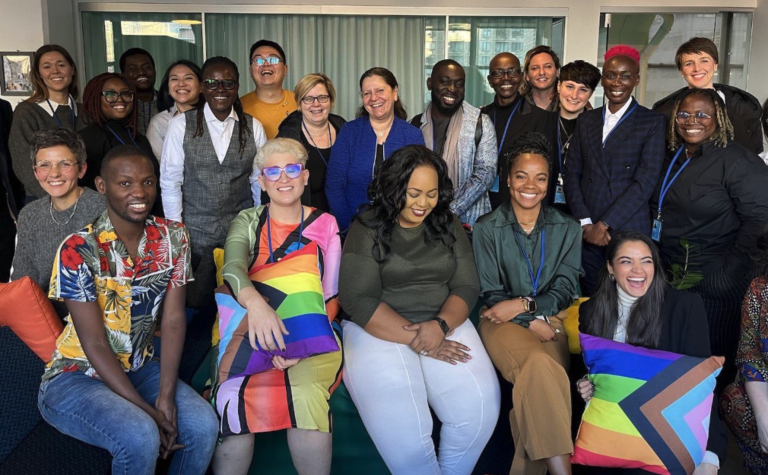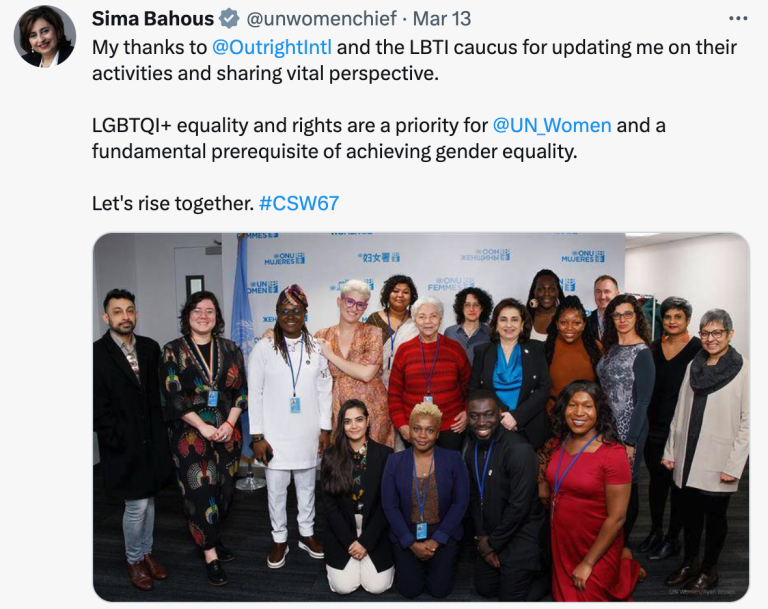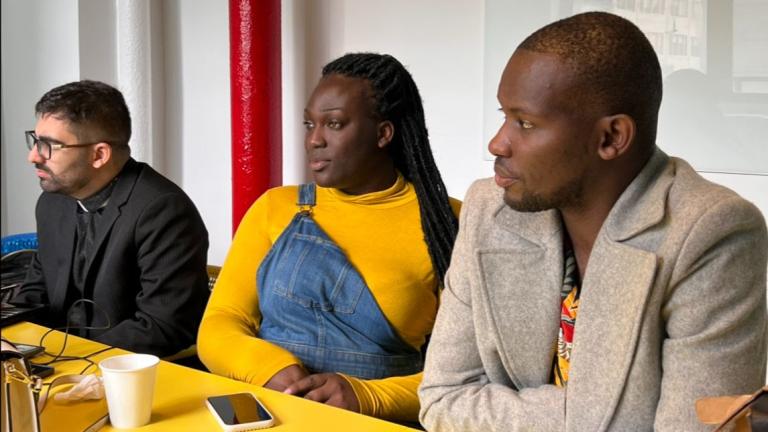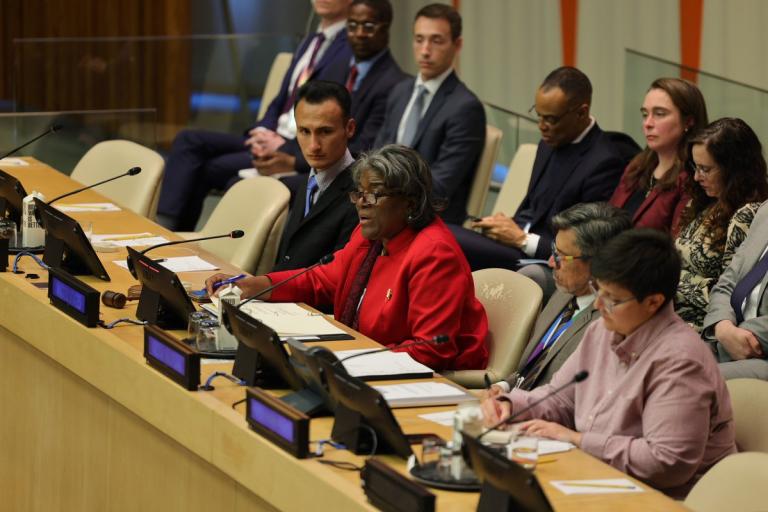
Insights
Outright’s Engagement at the UN
Region(s)
TOPIC(s)
Type
Commentary
Author(s)
Publish Date
April 10, 2023
Share
2023 is proving already to be a year of highs and lows for lesbian, gay, bisexual, transgender, intersex and queer (LGBTIQ) people. In Spain, a law came into effect allowing self-identification for persons wishing to change their legal gender marker; a few weeks later, parliamentarians passed an odious anti-homosexuality bill in Uganda. Across the world LGBTIQ people continue to face violence and discrimination in many different forms. Connecting this urgent reality with those who make decisions in the halls of power at the United Nations (UN) is right at the core of what Outright does.
With pandemic restrictions lifted, the UN is once again filling with the energy that civil society brings to this multilateral space. As 2023 kicks into gear, Outright has worked with a diverse range of civil society members, including by bringing our biggest ever delegation of civil society activists from around the globe to the Commission on the Status of Women to ensure that LGBTIQ voices and issues were heard and our presence was felt during discussions.
The Commission on the Status of Women
The 67th Session of the CSW took place from 6 to 17 March 2023 at the UN Headquarters in New York. CSW is the UN’s largest annual multilateral meeting, setting the global agenda for women’s rights and gender justice. The event brings together hundreds of world leaders, ministerial delegations, and civil society representatives. This year’s CSW theme focused on innovation and technological change, and education in the digital age for achieving gender equality and the empowerment of all women and girls.
This year’s CSW was the first to be held in-person with civil society participation since the COVID-19 pandemic. As a result, there were over four thousand registrations from civil society, and nearly a thousand parallel and side events were held alongside the official proceedings. Learning from the pandemic, many events were held in a hybrid format, enabling the participation of civil society representatives and activists who were unable to travel to New York.
As always, Outright worked closely with civil society activists to advance LGBTIQ inclusion at the CSW. While engagement with CSW is always a core component of the UN team’s work, this year we brought 16 LGBTIQ activists from 12 countries to the UN in New York, our largest CSW delegation to date.
Agreed Conclusions
Each year at CSW, Member States negotiate and commit to a final, formal document: the Agreed Conclusions, which guide states’ efforts at advancing gender equality. Civil society organizations can use the Agreed Conclusions to hold their governments accountable for commitments made and to advocate for further change at a domestic level.
Outright recognizes that the same systems of patriarchy, rigid gender binaries and archaic gender norms that oppress all women also keep LGBTIQ people marginalized and excluded, and that LBTI women and people face multiple and intersecting forms of discrimination. Therefore, Outright and its partners advocated for the inclusion of LBTI women and people and their needs in this year’s Agreed Conclusions. We also worked to advance an understanding of gender justice that includes eradicating discrimination based on sexual orientation, gender identity, gender expression and sex characteristics (SOGIESC).
In the face of anti-rights opposition, negotiations went until late in the dawn, with more language on diversity in previous years, but still no explicit references to SOGIESC were made in the document, due also to the unanimous agreement nature of the Agreed Conclusions. The final Agreed Conclusions do express Member States’ commitments to advancing the human rights of all women and girls, with a strong focus on preventing gender-based violence perpetuated through technology, an issue of particular salience for LGBTIQ communities.
Events at CSW
This year, Outright partnered with several other civil society organizations, Member States and United Nations Agencies to co-host four parallel events where LGBTIQ activists and human rights defenders from around the world shared their experiences and expertise. The events focused on the ways technology has impacted LGBTIQ lives, including through digital gender-based violence, and how it has presented both opportunities and challenges to LGBTIQ rights advocacy.
Events are a way to highlight the lived experiences of LGBTIQ activists, share reports and work that is being done on the ground, and set out civil society’s advocacy asks for gender equality to be achieved for all, including LGBTIQ persons. At a side event hosted by UN Women, a trans activist shared her concerns about being excluded from development efforts aiming to combat gender-based violence, prompting H.E. Olof Skoog, European Union Ambassador to the UN, to express the EU’s commitment to being a major donor on gender equality initiatives and recognize the need for greater unrestricted funding to grassroots LGBTIQ and women’s rights organizations in the Global South. Further, at an event focusing on combating Technology-Facilitated Gender-Based Violence, the Vice Minister for Multilateral Affairs of Colombia, Laura Gil, explicitly highlighted how we cannot tackle any of these issues without including a broad gender lens that is inclusive of LGBTIQ people.
LBTI Caucus
The Lesbian, Bisexual, Transgender and Intesex (LBTI) caucus is an informal group of over 300 LGBTIQ rights organizations and activists. As in previous years, Outright served as a co-convenor of the LBTI caucus, coordinating its advocacy efforts to ensure all women, girls and people are included in the progress made at CSW. In addition to coordination calls in the run-up to the CSW, the LBTI caucus met four times as a group during the Commission itself to strategize, coordinate speaking opportunities and check-in with the more than 50 LBTI activists that were in New York. It also collaborated with the Women’s Rights Caucus to ensure the LBTI caucus’ priorities were integrated into key advocacy efforts to influence the language of the Agreed Conclusions.

The LBTI caucus also met with several member states and UN agencies over the course of CSW, including with Belgium, the European Commission, Malta, the Netherlands, Norway, Antigua & Barbuda, and Sweden, with many of these meetings being organized by Outright. The caucus also met with the UN LGBTI Core Group and the Executive Director of UN Women. In these meetings, activists provided updates on their national and regional contexts for LGBTIQ people and suggested mutually beneficial actions for member states, the United Nations and LGBTIQ populations worldwide.

LBTI priorities and voices were raised in a number of high-level speaking engagements within the official CSW proceedings, with speaking slots facilitated by Outright. During the General Discussion, Ohotuowo Ogbeche, Outright International’s global researcher, delivered a statement on behalf of the LBTI caucus highlighting the need to include LBTI women in any discussion on the rights of women and gender equality.
Outright’s UN Rights and Religion Fellow Daniell Daphness delivered a statement during the first ever CSW Youth Dialogues, bringing attention to the specific needs of LBTI youth.
United Nations Rights and Religion Fellows
Outright welcomed its 2023 cohort of UN Rights and Religion Fellows in February. These six LGBTIQ human rights advocates will take part in a 12-month program that aims to reduce the impact of religiously motivated violence and discrimination against LGBTIQ people in the global South and East. This year’s fellows come from Brazil, St. Lucia, Côte d’Ivoire, Nigeria, Botswana, and Afghanistan. The program will focus on key advocacy opportunities, such as the High-Level Political Forum on the Sustainable Development Goals, the UN General Assembly High-Level week, Outright’s annual UN Advocacy Week and the OutSummit Conference. In March, the fellows were part of Outright’s delegation to the CS7, traveling to New York to bring their expertise directly to UN Member State and UN agency representatives.

Security Council Arria-Formula Meeting on the Human Rights of LGBTI Persons
On 20 March 2023, the UN Security Council held an Arria-formula meeting convened by the United States on “Integrating the Human Rights of LGBTI persons into the Council’s Mandate for Maintaining International Peace and Security.”
This was only the second time the Security Council discussed violence against LGBTIQ people, and the first time that such a meeting was open. The previous meeting was a closed discussion in 2015, and focused on atrocities perpetrated by the Islamic State in Iraq and Syria. This meeting discussed threats more broadly.
LGBTIQ defenders from Afghanistan and Colombia shared their own experiences and demonstrated how threats against LGBTIQ people are threats to international peace and security, a perspective also echoed by several Member States in their remarks.
Outright worked with civil society speakers and governments in the run-up to the event to ensure that key issues central to the experience of LGBTIQ people in conflict and crisis settings were raised, and also has offered 8 recommendations on how the Security Council and Member States might integrate LGBTIQ perspectives into their work.


Take Action
When you support our research, you support a growing global movement and celebrate LGBTIQ lives everywhere.
Donate Now